Strategic solution needed for discharge problems

A further £50m of capital funding will support the upgrade and expansion of ambulance hubs and hospital discharge lounges, enabling patients to be moved out of acute beds while they wait to be discharged.
The £200m is on top of the £500m adult social care discharge fund, which was announced in September. Funding arrangements for this initial discharge fund were only unveiled in the middle of November, with £200m being distributed to local authorities and £300m to integrated care boards. It was allocated in two tranches, starting in December and the second instalment due by the end of January.
NHS Confederation chief executive Matthew Taylor said that the service needed to see the full details of the proposed new funding. ‘Given the on-going delay in distributing the delayed discharge fund announced last autumn any funds will need to be rapidly deployed,’ he said.
Discharging more patients from hospital into care homes was a better alternative than medically fit patients being prevented from leaving hospital. But he said that it also ran the risk of people being inappropriately placed and then remaining in residential provision indefinitely. ‘Strengthening community capacity in both health and social care is the answer, but this takes investment and time,’ he added.
NHS Providers interim chief executive Saffron Cordery said trust leaders would ask whether the announcement was ‘too little too late’ to deal with what many warned last year would be the worst winter on record. A long hard look at what health and social care needed over the long term was required, rather than a series of short-term initiatives to fix the NHS.
‘[Trust leaders] will also want assurances that the £200m will be distributed immediately if it is to have a real impact on the current pressures facing the NHS. It is vital that the delays so far in distributing the £500m adult social care discharge fund, when it was urgently needed on the frontline and could have made a real difference, are avoided this time.’
David Fothergill, chairman of the Local Government Association Community Wellbeing Board said the crisis had been caused by a decade of consistent underfunding of social care and underinvestment in community health services and would not be fixed by ‘tacked-on funding’.
‘This piecemeal allocation of funding is no substitute for a strategic approach to the pressure on hospital beds, which requires a much broader range of actions to prevent admission, streamline discharge for those that do not need social care and focus on capacity to support recovery,’ he said.
He added that social care had a much broader role than easing the pressure on the NHS and needed to be seen as an essential service in its own right. ‘We have consistently said that £13bn is needed for social care so that its many pressures can be addressed and councils can deliver on all of their statutory duties,’ he said.
The Department of Health and Social Care said the new funding would support the discharge of thousands of extra medically fit patients into community care settings, such as care homes over the coming weeks. It will be used to pay for maximum stays of up to four weeks per patient until the end of March, with integrated care boards booking beds that are most appropriate to patients’ needs.
Mr Barclay also announced details of six national discharge ‘frontrunners’, which will trial long-term solutions to issues that result in patients staying in hospital longer than necessary. Ideas include dementia hubs, rehabilitative care solutions and new data tools to improve discharge management.
The Scottish government has also announced extra funding of at least £8m to procure around 300 additional care home beds to reduce the pressures caused by delayed discharge. The funding will allow boards to pay 25% over and above the national care home rate for beds. This is in addition to around 600 interim care beds already in operation across the country.
Related content
The Institute’s annual costing conference provides the NHS with the latest developments and guidance in NHS costing.
The value masterclass shares examples of organisations and systems that have pursued a value-driven approach and the results they have achieved.